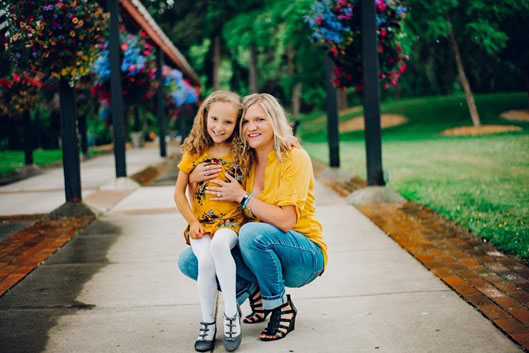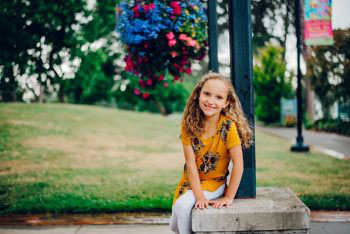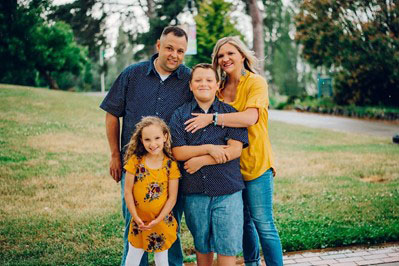Cutting-Edge Clinical Trials for Alagille Syndrome Help Families Find Relief from Rare Condition
2.2.2022 | Seattle Children's Press Team
 When Amanda Thorlacius found out she was pregnant with a little girl, she was overjoyed. But she wondered if her daughter would inherit the same genetic condition that robbed her of a normal childhood.
When Amanda Thorlacius found out she was pregnant with a little girl, she was overjoyed. But she wondered if her daughter would inherit the same genetic condition that robbed her of a normal childhood.
“Give me all the diseases in the world, but don’t give Alagille syndrome to my children,” Amanda said.
Alagille syndrome (ALGS) is a rare, inherited condition in which children may have too few bile ducts in the liver. This causes problems with the way bile moves and makes it hard for the body to remove toxins.
“The disorder can cause a spectrum of conditions in children and adults that range from liver disease to kidney disease, heart disease, and it can also affect their growth,” said Dr. Evelyn Hsu, chief of Gastroenterology and Hepatology at Seattle Children’s. “It sometimes causes jaundice and also debilitating itching. It really affects the quality of an individual’s life. Sometimes the itching is so debilitating that we will do a liver transplant to improve their quality of life.”
According to Hsu, ALGS accounts for about 3% of all pediatric liver transplants in the U.S. It’s one of the leading genetic causes of liver disease in children.
Born with ALGS, Amanda was seen by many different specialists at Seattle Children’s, including hepatologists and cardiologists, to manage her condition.
“I grew up at Seattle Children’s,” Amanda said.
Amanda underwent open-heart surgery when she was just 2 months old. She had another open-heart surgery on her second birthday and was followed closely by a hepatologist for most of her life.
“Had it not been for Seattle Children’s, I don’t think I would have survived,” Amanda said.
Her team at Seattle Children’s helped her along her medical journey, but it wasn’t without bumps. As a child, Amanda remembers the relentless itching caused by ALGS.
“I remember sitting on the bedroom floor scratching so hard I just wanted to rip my own skin off,” she said.
Fortunately, when Amanda hit puberty, the itching suddenly stopped.
“It was like a light switch turned off,” she said.
Starting a Family
 When her daughter Amelia was born, Amanda brought her to Seattle Children’s to meet with the genetics team. Amelia was diagnosed with the same condition, ALGS.
When her daughter Amelia was born, Amanda brought her to Seattle Children’s to meet with the genetics team. Amelia was diagnosed with the same condition, ALGS.
“Having grown up at Seattle Children’s, I was so grateful Amelia would be able to go to Seattle Children’s,” said Amanda. “You don’t realize how lucky you are to have that kind of healthcare close by until you hear from other people who don’t. We were so blessed.”
When Amelia was only 2 months old, she began trying to scratch her tiny body. The scratching worsened, and over time it became a normal part of Amelia’s life.
Research Driving Cures
Fortunately, for Amelia, Seattle Children’s emphasis on research meant she would have access to the most current, state-of-the-art therapies, many of which are only available through clinical trials.
Dr. Evelyn Hsu is the principal investigator for clinical trials of the investigational drug Maralixibat. The Gastroenterology and Hepatology division at Seattle Children’s has been involved in the multi-center clinical trial for the drug during the last seven years. Seattle Children’s has participated in studies to evaluate the long-term safety, tolerability and efficacy of the drug.
“It’s been a miracle drug for families,” said Melissa Young, clinical research supervisor at Seattle Children’s.
When Amelia started Maralixibat, she finally found relief from the itching. It was no longer a distraction in her life.
“Families enrolled their children into the study searching for something that would help with the uncontrollable itching that can be associated with cholestatic liver disease. This drug has changed these kids’ lives,” Young said.
Today, more children have access to Maralixibat. The drug was recently approved by the Food and Drug Administration for kids with Alagille syndrome whose flow of bile from the liver is reduced or blocked.
“Seattle Children’s is able to take advantage of opportunities that are available to kids with really rare conditions,” Hsu said. “We’re really invested in finding the solution to their problems and helping them live their best lives. Whether that’s through the treatment we provide or looking into experimental therapies that are going to open new doors for them, we’re committed to them.”
A Bright Future
 Amanda and Amelia have been involved in three different clinical trials at Seattle Children’s. They hope through research, a cure for ALGS can be found.
Amanda and Amelia have been involved in three different clinical trials at Seattle Children’s. They hope through research, a cure for ALGS can be found.
“When I was a kid, I just wanted to feel normal,” Amanda said. “I was told I couldn’t do sports or have children. I didn’t want Amelia to have to go through that.”
To other families who have been diagnosed with ALGS, Amanda offers words of encouragement.
“Whatever your kid wants to do, skiing, having children, becoming a pilot or playing football, whatever your kid wants to do – let them dream,” she said. “Let them do what they feel inspired to do. No matter what, ALGS or not, it’s going to be OK.”
Amanda said Hsu has always inspired her to help Amelia dream big. She hopes doctors and researchers like Hsu and Young will continue to provide the same hope and care she and Amelia have received at Seattle Children’s.